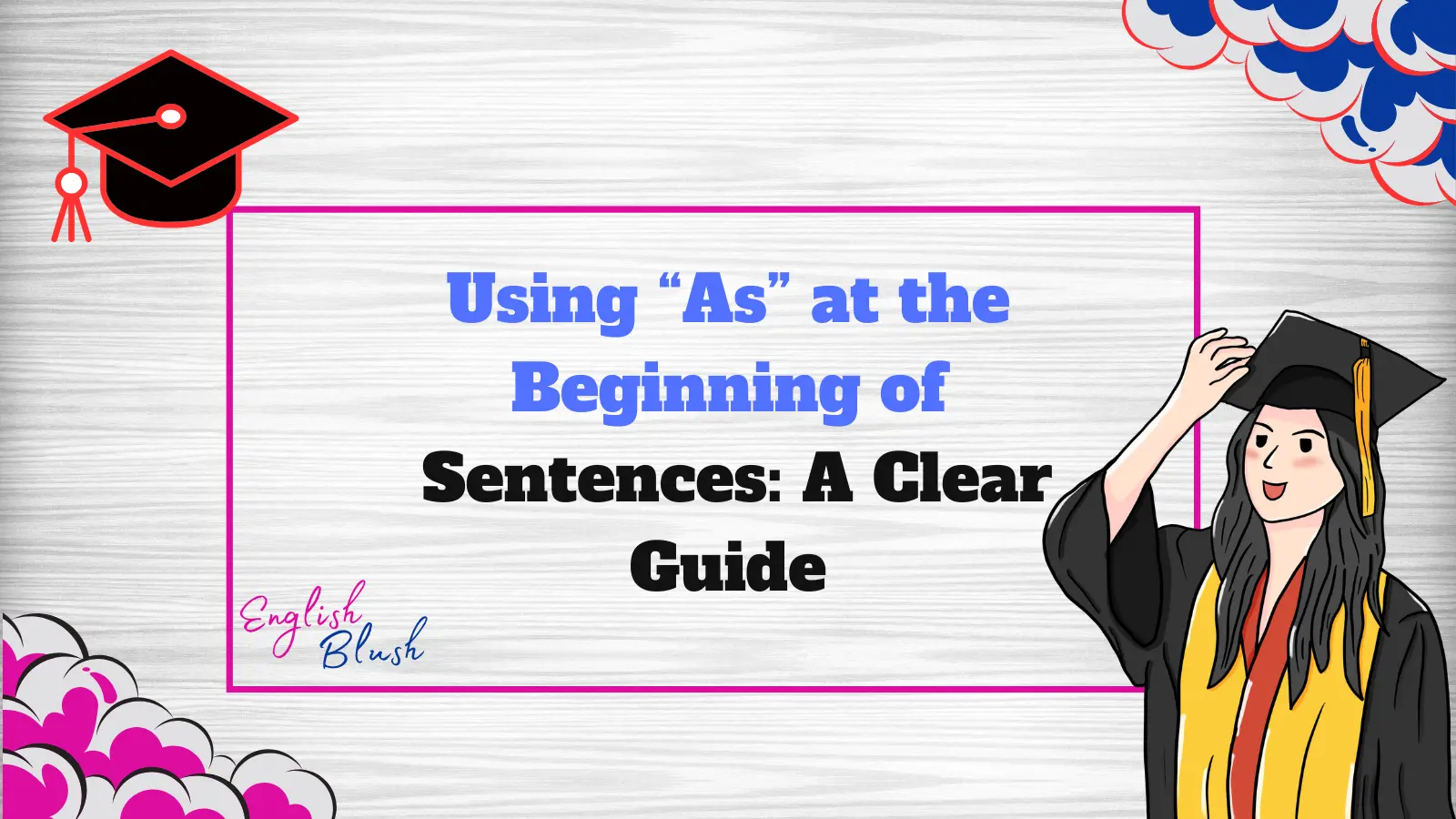Starting sentences with “as” can make your writing clearer and more engaging. But, when used incorrectly, it can confuse readers. This article will explore how to use “as” correctly at the start of sentences, cover its different roles, and show alternatives for both formal and informal contexts.
What Does “As” Mean?
“As” is a versatile word with multiple meanings. It connects ideas, compares things, and explains reasons. Its meaning depends on how it’s used in a sentence. Below are the main uses:
- To Show Cause or Reason
Example: As it was raining, we stayed inside.
(Why did they stay inside? Because it was raining.) - To Show Time or Simultaneity
Example: As I walked, I listened to music.
(This shows two things happening at the same time.) - To Make Comparisons
Example: As fast as a cheetah, she raced across the field.
Now, let’s dive into when it’s appropriate to begin sentences with “as.”
Using “As” at the Start of Sentences
Starting sentences with “as” is common in both formal and informal writing. Here’s how it works:
1. To Explain a Cause (Reason)
You can start with “as” to explain why something happens. It works much like “because.”
- Example: As the project was delayed, we had to reschedule the meeting.
- Meaning: The meeting was rescheduled because the project was delayed.
When to Avoid It
Starting with “as” might confuse readers if the sentence is long or complicated. In these cases, “because” can work better.
2. To Indicate Time
“As” often introduces actions that happen together.
- Example: As the sun set, the sky turned orange.
- Meaning: The two events—sun setting and sky turning—happened at the same time.
Informal Alternative
In casual writing, you could say: The sky turned orange when the sun set.
3. To Compare or Describe
You can use “as” to compare things or describe how something happens.
- Example: As brave as a lion, she faced the challenge.
- Example: As the months passed, he grew more confident.
Alternatives to Starting with “As”
While “as” is useful, overusing it can make your writing repetitive. Here are some alternatives:
For Explaining a Cause (Reason)
- Because: Because it was raining, we stayed home.
- Since: Since the car broke down, I had to take the bus.
For Showing Time
- When: When the clock struck midnight, the party ended.
- While: While I was cooking, she set the table.
For Comparisons
- Like: She ran like the wind.
- Just as: He danced just as gracefully as a professional.
Formal vs. Informal Usage of “As”
When deciding whether to use “as,” consider your audience and the tone of your writing.
Formal Writing
In formal contexts, “as” is appropriate and widely accepted. It often appears in essays, reports, and professional emails.
- Example: As the data shows, customer satisfaction is improving.
Informal Writing
In casual writing, alternatives like “since” or “because” may sound more natural.
- Example: Since it was raining, we stayed inside.
Informal Tip
In informal speech or writing, shorter sentences and simpler connectors often work better.
Examples of “As” in Sentences
Let’s see more examples to understand how “as” works in different situations.
Showing Cause or Reason
- Formal: As the team was tired, we ended the meeting early.
- Informal: We stopped the meeting early because the team was tired.
Showing Time
- Formal: As the orchestra played, the audience sat in silence.
- Informal: The audience sat quietly while the orchestra played.
Making Comparisons
- Formal: As important as this issue is, we need to consider other factors too.
- Informal: This issue is important, but we should think about other things too.
Common Mistakes When Using “As”
Using “as” can sometimes lead to awkward or unclear sentences. Here are common pitfalls:
1. Overloading the Sentence
- Confusing: As the bell rang, signaling the end of class, the students rushed out, leaving the teacher no time to give homework.
- Better: The bell rang, signaling the end of class. The students rushed out, leaving no time for the teacher to assign homework.
2. Mixing Tenses Incorrectly
- Confusing: As she walked into the room, she forgets her lines.
- Better: As she walked into the room, she forgot her lines.
Quick Tips for Using “As” Effectively
- Keep sentences clear and concise: Long sentences with “as” can confuse readers. Break them up if needed.
- Choose alternatives for variety: Use “because,” “when,” or “since” to avoid repetition.
- Match the tone: Use “as” in formal writing and simpler alternatives in informal writing.
Final Thoughts
Using “as” at the start of sentences can improve your writing when done correctly. It’s a great way to connect ideas, explain reasons, or describe events happening at the same time. However, overusing it or creating long, complex sentences can make your writing harder to follow.
By practicing with examples and choosing the right alternatives when needed, you can make your writing clear, varied, and effective.





